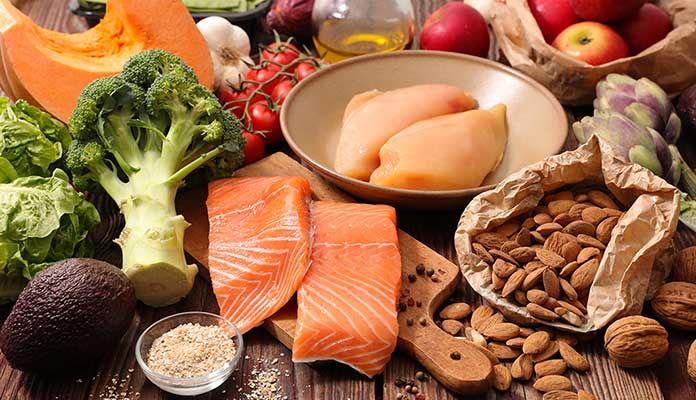Nourishing our bodies with a well-balanced diet is crucial for optimal health and well-being. A well-rounded meal encompasses a variety of food groups, providing the essential nutrients, vitamins, and minerals that our bodies require to function effectively. This comprehensive guide will explore the key components of a balanced diet, offer a week-long plan for creating well-rounded meals, and provide strategies for incorporating this approach into your everyday life.
The Essential Food Groups

A balanced diet includes the following food groups:
Fruits and Vegetables
Rich in vitamins, minerals, antioxidants, and fiber, fruits and vegetables are vital for maintaining a healthy immune system, reducing inflammation, and promoting overall well-being. These nutrient-dense foods should make up a significant portion of our daily intake.
The Benefits of Fruits and Vegetables
Fruits and vegetables are packed with a wide range of essential nutrients, including:
- Vitamins: Vitamins A, C, E, and a variety of B vitamins, which support immune function, skin health, and energy production.
- Minerals: Potassium, magnesium, calcium, and iron, which are crucial for bone health, muscle function, and blood circulation.
- Antioxidants: Compounds like carotenoids, flavonoids, and polyphenols, which help neutralize harmful free radicals and reduce the risk of chronic diseases.
- Fiber: Insoluble and soluble fiber, which promote digestive health, regulate blood sugar levels, and support heart health.
Incorporating Fruits and Vegetables into Your Diet
To ensure you’re getting a variety of fruits and vegetables in your diet, aim to include a wide range of colors and textures. Here are some tips:
| Tip | Example |
|---|---|
| Eat a rainbow of produce | – Red: Tomatoes, strawberries, red peppers- Orange: Carrots, sweet potatoes, mangoes- Green: Spinach, broccoli, kiwi- Blue/Purple: Blueberries, eggplant, red cabbage |
| Try new fruits and vegetables | – Unfamiliar options like kale, Brussels sprouts, or starfruit- Seasonal and locally grown produce for maximum freshness and nutrition |
| Incorporate them into every meal | – Add berries to your breakfast oatmeal- Include a side salad or roasted vegetables with lunch and dinner- Snack on vegetable sticks with hummus or a piece of fruit |
Whole Grains
Whole grains provide complex carbohydrates, fiber, and essential nutrients such as B vitamins, iron, and zinc. They help regulate blood sugar levels, support digestive health, and reduce the risk of chronic diseases.
The Benefits of Whole Grains
Whole grains offer a wide range of health benefits, including:
- Complex Carbohydrates: Provide a steady source of energy, helping to regulate blood sugar levels and prevent blood sugar spikes.
- Fiber: Promotes healthy digestion, supports gut health, and may help lower cholesterol levels.
- Nutrient-Richness: Contain a variety of vitamins, minerals, and phytochemicals that support overall health.
- Reduced Disease Risk: Consumption of whole grains has been linked to a lower risk of heart disease, type 2 diabetes, and certain types of cancer.
Incorporating Whole Grains into Your Diet
To ensure you’re getting enough whole grains, try to replace refined grains (such as white bread, pasta, and rice) with their whole-grain counterparts. Here are some ideas:
- Breakfast: Oatmeal, whole-grain cereal, or whole-grain toast
- Lunch and Dinner: Brown rice, quinoa, whole-grain pasta, or whole-grain bread
- Snacks: Popcorn, whole-grain crackers, or a small serving of whole-grain granola
It’s important to remember that not all “whole grain” products are created equal. Be sure to check the ingredient list and look for products that list a whole grain as the first ingredient.
Lean Proteins
Lean proteins, such as fish, poultry, beans, and nuts, are essential for building and repairing tissues, maintaining muscle mass, and producing hormones.
The Benefits of Lean Proteins
Lean proteins offer a range of health benefits, including:
- Tissue Repair and Maintenance: Proteins are the building blocks of our cells, tissues, and organs, helping to repair and maintain them.
- Muscle Development and Preservation: Adequate protein intake is crucial for building and maintaining strong, healthy muscles.
- Hormone Production: Proteins play a vital role in the production of hormones, which regulate various bodily functions.
- Satiety and Weight Management: Protein-rich foods can help you feel full and satisfied, supporting healthy weight management.
Incorporating Lean Proteins into Your Diet
To ensure you’re getting enough lean protein, aim to include a variety of sources in your meals and snacks. Here are some ideas:
- Lean Meats: Chicken, turkey, lean cuts of beef or pork
- Fish and Seafood: Salmon, tuna, shrimp, tilapia
- Beans, Lentils, and Legumes: Chickpeas, black beans, lentils, edamame
- Nuts and Seeds: Almonds, walnuts, chia seeds, flaxseeds
- Dairy or Dairy Alternatives: Greek yogurt, cottage cheese, plant-based milk and yogurt
When choosing protein sources, opt for lean, minimally processed options and aim for a variety to ensure you’re getting a range of essential amino acids.
Healthy Fats
Healthy fats, found in foods like olive oil, avocados, and nuts, provide energy, support hormone production, and improve brain function.
The Benefits of Healthy Fats
Incorporating healthy fats into your diet can offer the following benefits:
- Energy Provision: Fats are a concentrated source of energy, providing 9 calories per gram.
- Hormone Production: Certain fats, such as omega-3s, are essential for the production of hormones that regulate various bodily functions.
- Brain Health: Healthy fats, particularly omega-3s, are crucial for brain development and function, as well as cognitive performance.
- Heart Health: Unsaturated fats, like those found in olive oil and avocados, can help lower cholesterol levels and reduce the risk of heart disease.
Incorporating Healthy Fats into Your Diet
To ensure you’re getting enough healthy fats, focus on incorporating the following foods into your meals and snacks:
- Olive oil, avocado oil, or nut oils for cooking and dressings
- Avocados, nuts, and seeds
- Fatty fish like salmon, mackerel, and sardines
- Olives and olive tapenade
- Nut and seed butters
It’s important to note that while healthy fats are essential, they should be consumed in moderation, as they are high in calories. Aim for a balanced approach, incorporating healthy fats while being mindful of portion sizes.
Dairy or Dairy Alternatives
Dairy and dairy alternatives, such as milk, yogurt, and plant-based milks, are sources of calcium, vitamin D, and protein. They help maintain strong bones and teeth.
The Benefits of Dairy or Dairy Alternatives
Incorporating dairy or dairy alternatives into your diet can provide the following benefits:
- Calcium: Dairy and dairy alternatives are excellent sources of calcium, which is essential for maintaining strong bones and teeth.
- Vitamin D: Many dairy products are fortified with vitamin D, which works in tandem with calcium to support bone health.
- Protein: Dairy products, such as milk and yogurt, are rich in high-quality protein, which is important for muscle development and maintenance.
- Gut Health: Fermented dairy products, like yogurt and kefir, contain probiotics that can support a healthy gut microbiome.
Incorporating Dairy or Dairy Alternatives into Your Diet
To ensure you’re getting enough dairy or dairy alternatives, consider the following options:
- Milk: Cow’s milk, almond milk, soy milk, oat milk, or cashew milk
- Yogurt: Greek yogurt, plain yogurt, or plant-based yogurt alternatives
- Cheese: Opt for low-fat or reduced-fat varieties, such as cottage cheese or ricotta
- Calcium-fortified plant-based milk or yogurt alternatives
When choosing dairy or dairy alternatives, be mindful of added sugars and opt for unsweetened or lightly sweetened options whenever possible.
A Week-Long Plan for Well-Rounded Meals

Creating a well-rounded meal plan for the week can help ensure you’re getting a balance of essential nutrients from the various food groups. Here’s an example of a week-long plan:
Monday
Breakfast: Oatmeal with sliced bananas, a sprinkle of cinnamon, and a tablespoon of almond butter Lunch: Grilled chicken salad with mixed greens, cherry tomatoes, avocado, and a balsamic vinaigrette Dinner: Baked salmon, roasted sweet potatoes, and steamed broccoli
Tuesday
Breakfast: Greek yogurt with fresh berries and a drizzle of honey Lunch: Whole-grain wrap with hummus, sliced cucumbers, and roasted red peppers Dinner: Quinoa and black bean burrito bowl with sautéed peppers and onions, topped with diced avocado
Wednesday
Breakfast: Whole-grain toast with mashed avocado and a poached egg Lunch: Lentil and vegetable soup with a side of whole-grain crackers Dinner: Baked chicken breast, roasted broccoli, and brown rice
Thursday
Breakfast: Smoothie with spinach, banana, almond milk, and a scoop of protein powder Lunch: Tuna salad on a bed of mixed greens, with sliced tomatoes and cucumbers Dinner: Spaghetti with whole-grain pasta, turkey meatballs, and a side salad
Friday
Breakfast: Overnight oats with chia seeds, sliced strawberries, and a sprinkle of walnuts Lunch: Grilled chicken and veggie kebabs with a side of quinoa Dinner: Baked cod, roasted Brussels sprouts, and a small baked potato
Saturday
Breakfast: Scrambled eggs with spinach and whole-grain toast Lunch: Veggie and bean burrito bowl with brown rice, black beans, salsa, and avocado Dinner: Grilled steak, roasted asparagus, and a baked sweet potato
Sunday
Breakfast: Whole-grain pancakes with blueberries and a side of turkey bacon Lunch: Chicken and vegetable stir-fry over brown rice Dinner: Baked lentil and vegetable lasagna with a side salad
Remember, this is just an example, and you can customize the meals based on your personal preferences and dietary needs. The key is to aim for a variety of nutrient-dense foods from the different food groups throughout the week.
Strategies for Incorporating Well-Rounded Meals into Your Lifestyle
Incorporating well-rounded meals into your daily routine can seem daunting at first, but with a few strategies, it can become a sustainable habit. Here are some tips to help you achieve this:
Meal Prepping
Dedicating time to meal prep can be a game-changer in ensuring you have access to well-balanced meals throughout the week. Try the following strategies:
- Cook larger batches of whole grains, proteins, and vegetables on the weekends or one day a week, and portion them out for easy assembly during the week.
- Chop and store fresh produce, so it’s ready to be added to your meals.
- Prepare sauces, dressings, and marinades in advance to add flavor and variety to your meals.
Embrace Variety
Avoid falling into a rut by constantly introducing new foods and recipes into your rotation. Experiment with different fruits, vegetables, whole grains, and protein sources to keep your meals interesting and ensure you’re getting a wide range of nutrients.
Plan Ahead
Take some time at the beginning of the week to plan out your meals and snacks. This will help you create a grocery list, ensure you have all the necessary ingredients on hand, and minimize the temptation to make less-than-ideal choices when you’re short on time.
Make It Convenient
Prepare well-rounded meals in bulk and store them in the refrigerator or freezer for easy access. This can include things like pre-portioned salads, grain bowls, or casseroles that can be quickly reheated.
Involve the Whole Family
Making well-rounded meals a family affair can make the process more enjoyable and sustainable. Engage your family in the meal planning and preparation process, allowing everyone to contribute ideas and explore new foods together.
Celebrate Small Wins
Recognize and celebrate your progress, even if it’s a small step. Acknowledging your efforts and successes can help you stay motivated and committed to maintaining a well-balanced diet.
Crafting well-rounded meals is an essential aspect of maintaining overall health and well-being. By incorporating a variety of nutrient-dense foods from the essential food groups, you can ensure your body receives the nourishment it needs to thrive. Whether it’s starting your day with a balanced breakfast, packing a wholesome lunch, or preparing a well-balanced dinner, making conscious choices about your diet can have a profound impact on your physical and mental health.
Remember, the journey to a well-rounded diet is an ongoing process, and it’s important to be patient and kind to yourself along the way. By planning, experimenting, and making small, sustainable changes, you can develop a sustainable approach to eating that supports your overall wellness. Embrace the benefits of a well-rounded diet, and enjoy the journey of nourishing your body and mind.
